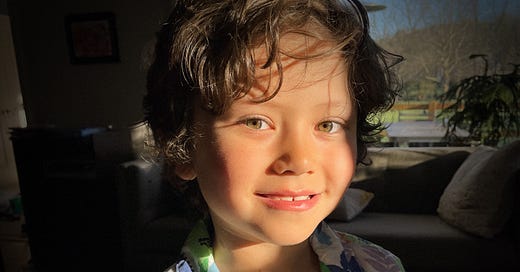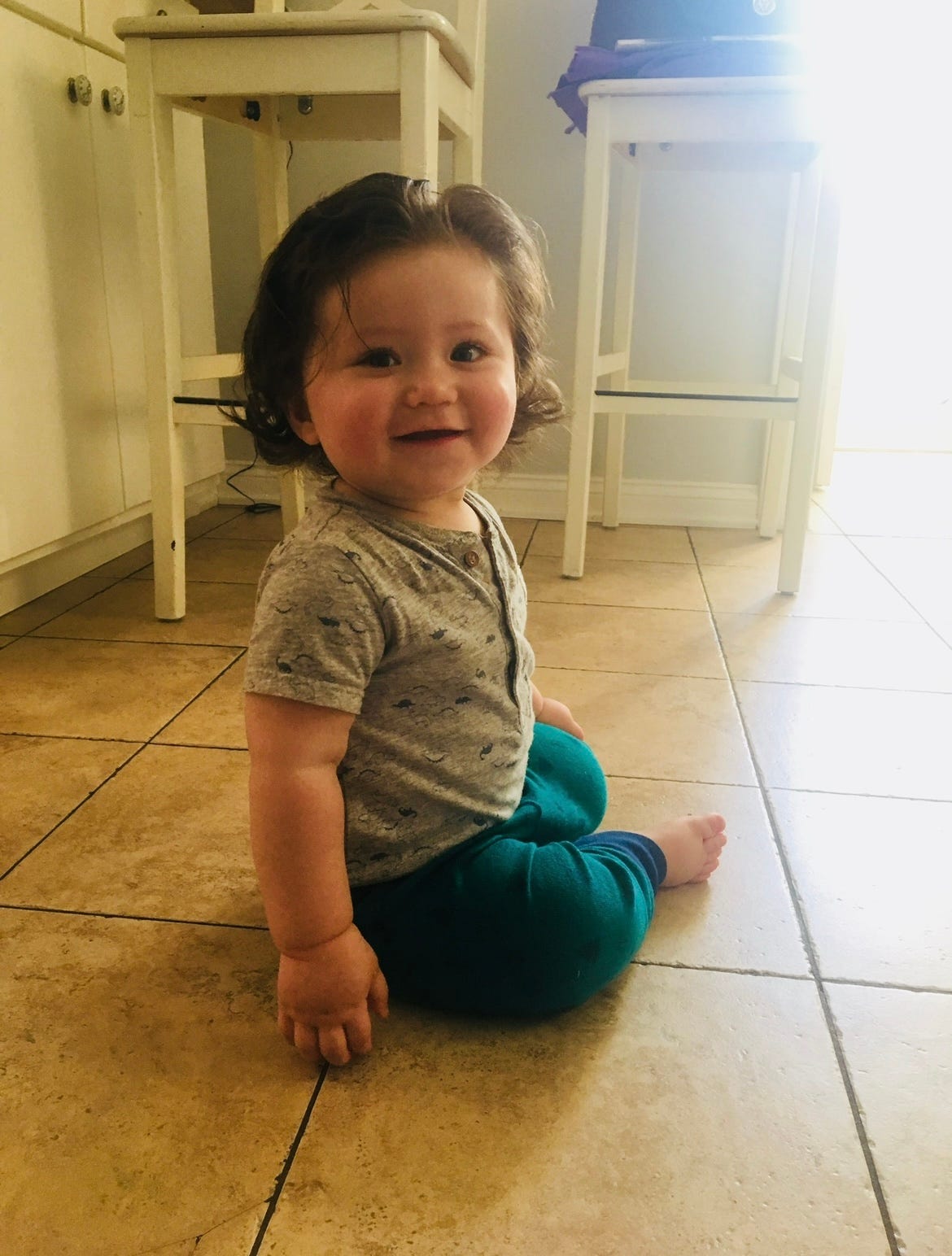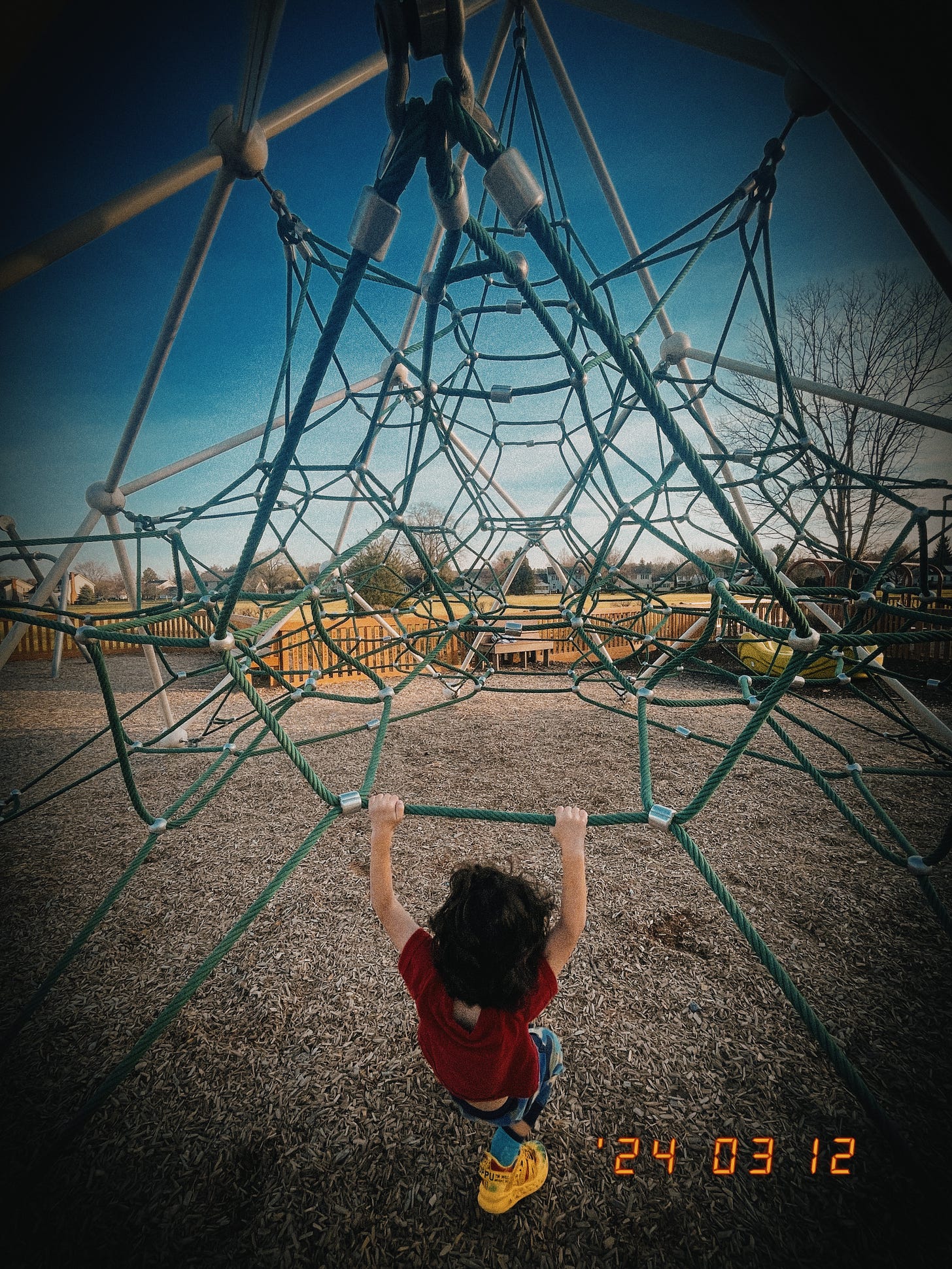Innocence Unearthed: A Man's Journey to Soulful Reconnection
Boyish Purity as a Path to the True Self
On Tuesday of this past week, my oldest son J, aged six, and I got into our SUV after his Taekwondo class. As we buckled in he excitedly asked me to play “The Garden Song,” a song he had started to mumble in recent weeks because he was to sing in first upcoming school concert. Immediately I found a version on Spotify by John Denver. As I hit play, J proclaimed it was not the right song, even though I saw the lyrics and knew he was incorrect. I looked back at him through the rear-view mirror, and as soon he he heard the first word of the lyrics, he straightened his back, sat up in his car seat, and began to sing.
What happened next is going to be hard to articulate into words. His eyes lit up and he proudly sang the song with such beauty, such sweetness, and innocence – it broke my heart and renewed me simultaneously. There we were, in a somewhat ugly strip mall parking lot on a cloudy Tuesday evening, and I felt like I witnessed an eternity of spirit in those few minutes. As the song almost ended, J looked to me and said, “daddy are you crying?” “Yes buddy I – that was just awesome,” I said. “You have to tell mommy I made you cry when we get home,” he proclaimed. I smiled and we began to drive.
Now four or five days after the fact, I cannot that moment out of my head. Why did witnessing my son sing that way touch me so profoundly?
In his eyes, in his voice, and in his presence in those few minutes was a kernel of something ridiculously challenging to put into words. The best I can come up with right now is this: in those few minutes of J singing, he displayed a radical hope and belief in this world. In his innocence and purity, I felt the light of his soul and being feeling safe and open to be present and incredibly alive.
J showed me that he was willing to put all of himself on the line. He was unashamedly his true self in that moment. The world of divinity, of imagination, of the cosmos and beyond met the earthbound for him while singing the Garden Song. There was a sense of wonder, of curiosity, and an unspoken commitment to his life. Nothing was hidden – he was pure human gold! I’d be a fool or liar to not admit that the sight reminded me of my own innocence that wishes to live alongside his.
“Inch by inch, row by row, Gonna make this garden grow, All it takes is a rake and a hoe, and And a piece of fertile ground – Inch by inch, row by row, Someone bless these seeds I sow, Someone warm them from below Till the rain comes tumblin’ down.” - Garden Song by John Denver (1st Verse)
Upon more deep reflection, it was J’s unabashed expression in that moment that opened a door for me. He wasn’t ashamed, he wasn’t embarrassed, he was forthright, direct, and open to perform. He wanted to shine, and he did – without abandon.
Damn it I hope he never loses that spark. As a matter of fact, that is part of what terrifies or haunts me about it – perhaps as a shadowy underbelly – or a profound existential concern for him as a boy in this American culture.
How many more years until that spark is hidden? How many more days do I get the privilege to witness my sweet boy who has hope for his life and the world? Before society gets its dirty hands in there and tells him to shove all of that away? No! I will not stand for that. I will not allow him to become another young man, sickened and ashamed of his innocence and the inner beauty that it’s connected to.
Why does this scare me so much? Seeing my boy lose that spark…
Perhaps the lost of boyish innocence – and the seeds of potential it is connected to – is something that I see banished from many of the men around me – many of the men closest to me. I am lucky enough to still be close to more than a few childhood male friends of mine. Believe me, I know it is a gift. What is most tragic about the loss of their boyish spark is that it’s not immediately apparent to the naked eye. This loss is compensated sometimes in their overly positive or cheery persona and general upbeat demeanor. I know plenty of happy go lucky guys who feel it is a responsibility to be cheerful and optimistic – not because they necessarily feel that way, but because anything other than that in their childhood homes was not acceptable. They were boys – they weren’t allowed to be sullen, ashamed, upset, emotional, sensitive, silly, loud, artistic, genuine, real – they couldn’t be themselves. They were conditioned to be steady, cheerful, and smiley, or worse – steady and straight-edged.
So they got older, and under the guise of their white-toothed smiles lay a deep shame. A shame that is a direct result of their innocence, their spark never being properly mirrored or contained – or better said, cherished, enjoyed, or accepted. Especially accepted by their fathers or older men. Many of my male friends mothers met their innocence, until their dads decided their innocence was no longer meaningful. Their dads couldn’t bare to face their own lost innocence in their sons’ eyes, so why not just banish it altogether. This is how masculine shame is born.
To delve deeper into the topic of shame and satiate my curiosity, I just started reading The Many Faces of Shame by Donald L. Nathanson, and this following quote really stands out to me.
“The very word shame is a derived from an Indo-European root (skam or skem) which means “to hide,” and from which also derive our words skin, and hide, the latter in both of its meanings: the hide which covers us naturally, and that within which we seek cover. We learn hide first for the sake of shame, and later for protection from physical danger.” – Donald L. Nathanson, The Many Faces of Shame
Men become masters of hiding – unconsciously spreading out lost parts of their discarded innocence in tiny hidden closets, and under the floorboards in deep recesses of their psyches. So they go to their doctors or psychiatrists and get prescribed anti-depressants, numbing them further from the core vitality that was extinguished in them at such a young age they cannot properly remember. Of course, this tragic and popular form of treatment does not adequately release the frozen and hidden innocence, but further exacerbates the lack of ability of these men to necessarily feel the grief of their loss of it in the first place.
What these men, including my friends, including me, need to know is that genuine healing – proper, red-blood and full vitality will only return when they find a way to welcome their lost innocence back into life. If this doesn’t happen, most likely tragedy will slowly ensue.
“When innocence has been deprived its entitlement, it becomes a diabolical spirit.” – James Grotstein
“How the fuck am I supposed to do that?” This is what I imagine men saying to me after reading this. “What the hell are you talking about – recovering my lost innocence?”
While mainstream psychology tries to eradicate “negative psychological symptoms” at all costs – depth psychology asks questions of the symptoms. In other words, what could these neurotic or depressive symptoms be calling or pointing to? Could perhaps these lost shards of innocent boyhood be screaming or singing from these dark recesses, and these current symptoms be an appearance of that below the surface noise?
I don’t know about you, but the last time I played hide and go seek with my sons, if I didn’t find them in a short enough time, they started calling for me.
Catch my drift? You don’t go find that lost inner boy, he’ll get louder and louder – and this may show up in your life as addiction, worsening relationships, etc.
“The need opens the door to the little boy, and the little boy opens the door to the imagination.” – James Hillman
Symptom –> Need –> The Innocent Inner Boy –> Imagination & Play
If we men can have the courage to follow our disturbing symptoms, follow the need in that symptom, open the door to encounter and grieve the inner boy in the dark, then we can open the door again to the imagination – and when we open to the imaginal – our innocence, playfulness, and energy for life can return.
The imagination is connected to the eternal realm, just as our innocence is. When we lose our portal of connection to the divine, the Eternal, The Self, The Tao – whatever you wish to call it – we lose energy, hope, and profound sense of personal meaning.
“As Jung demonstrated, the child – as symbol – is the the child suspended between two worlds, one material, one spiritual, one inner, one outer, and the dual aspect of the child is part of what marks him or her as a symbol for that paradoxical unity or wholeness that we associate with full aliveness and therefore with the human soul.” – Donald Kalsched, Trauma and the Soul
If men, either in their family of origin, their schools, or their communities – are not, as they grow from child to adolescent, allowed without much interference, to continue to grow into their individual relationships to both worlds, a sort of traumatic rupturing occurs. However, we just like to call this in our modern American society, “growing up.”
“When trauma occurs in a child’s life, one of the most tragic results is the foreclosure of transitional space. This means that the soul can no longer remain present in the mytho-poetic matrix between the worlds–can no longer “indwell",” at least temporarily. But this is not the end of the matter. Many experiences in life re-open transitional space. As psychotherpahy begins, for example, transitional space is often reconstituted in the relationship with the therapist. After what may have been a period of depression, the patient begins to hope and dream again. As the imagination is opened again, the two worlds we have described are potentitated. It is as though the child is a spark that jumps across a synapse created by the proximity of these two worlds as they come to presence through relationship.” – Donald Kalsched, Trauma and the Soul
In others words, we could say that modern men, predominantly but not exclusively, have been initiated through societal pressure and suppression, into a poverty of imaginal experience. That part and parcel of “becoming a man” is robbing this man of his fortified “transitional space,” his own access to his imaginative experience. Because of this, he can no longer find access to his own innocent maleness, and the vision it holds for bringing all of himself into a culture that so desparately needs all of his glory.
The imagination is not just child play, daydreamy fantasy, or all of these B.S. cultural terms that we use so commonly to define it.
Yet, how many of you men feel much more at ease at accepting the images thrown at you from the television than wrestling with your own?
The time has come to engage with your own images again – and in the process, step into in the riches that your lost innocence is asking of you.
-David B. Godin
DURDEN is an upcoming Jungian coaching consultancy for midlife men, launching in late 2024. For more information, please subscribe.
Sources:
James Hillman
Donald Kalsched
Donald Nathanson
James Grotstein
John Denver (Sesame Street)












Another cracking post David, I find imagination, play and experimenting are spaces that are integral to me feeling alive.
I participated very recently in a tea ceremony and while some in the room were able to sing their hearts out, I just couldn't. I was stuck. And I remembered that when I was a pre-teen I was the lead singer of a rock band. We actually played decent sized shows and appeared on TV at one point. What a shift from having once belted it out to then be completely shut off in the throat even amongst a group of gentle, loving individuals. Well, their example (when they sang) had such a profound effect on me, I have been practicing some of my personal favorites at full vocal projection for the next opportunity to share my imagination, playfulness and spirit. Nice one, David.